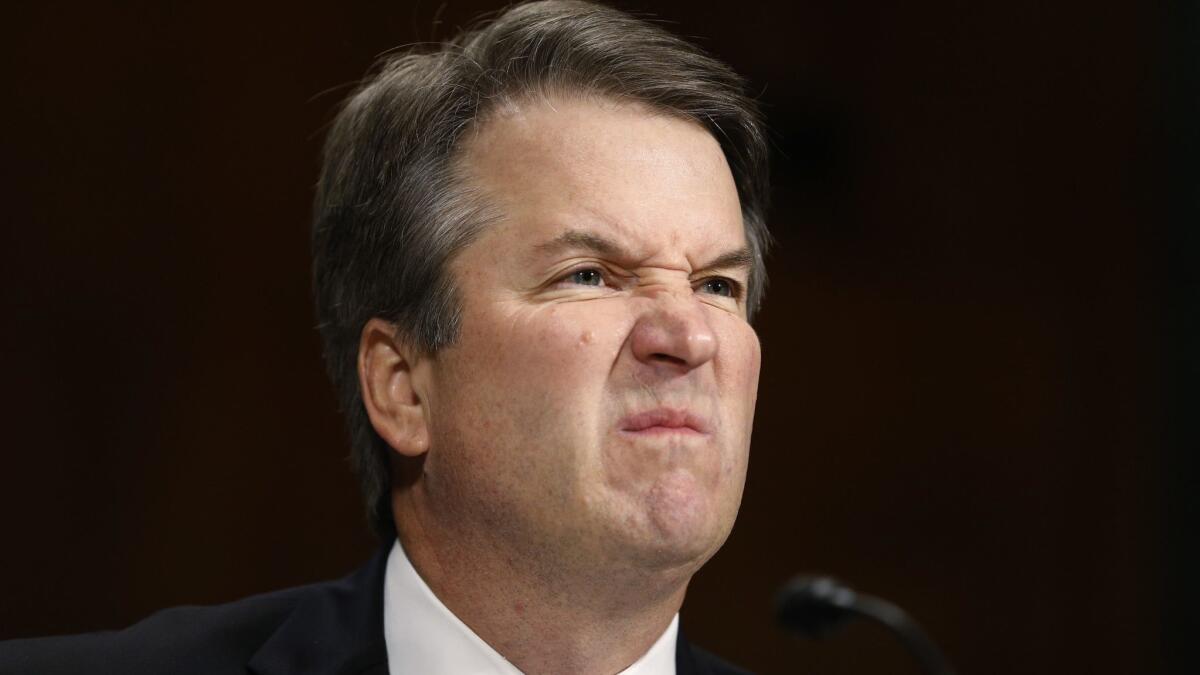Op-Ed: Blame Kavanaugh’s naked partisanship for this mess

- Share via
Many things are broken, and perhaps beyond repair, in our process of appointing Supreme Court justices. But the situation we face right now is not a byproduct of that. It is the more direct outcome of the extraordinary hearing before the Senate Judiciary Committee on Sept. 27.
Both witnesses’ families received vicious threats: Emotions were understandably raw. But only Brett Kavanaugh located a partisan political source for his pain. He lashed out at a “calculated and orchestrated,” “coordinated and well-funded” “left-wing” conspiracy to “destroy” him built on anger about the 2016 election results and “revenge on behalf of the Clintons.” He named his enemies by party.
These were not off-the-cuff responses, but remarks written the night before — with time to cool down. For a sitting federal judge, the way he chose to represent his candidacy for a higher judicial position was not particularly judicious.
No one thinks justices arrive on the bench as a tabula rasa. Judges have jurisprudential predilections that often (though not always) correlate with partisan affiliation. But the jurists we admire do not think of themselves as playing for a partisan team. Per Sen. Ben Sasse, judges’ robes are neither blue nor red, but black. Even the searing political moment of Bush vs. Gore, which had direct electoral consequence, is better explained by different visions of law than by party preference.
Enter the Fray: First takes on the news of the minute from L.A. Times Opinion »
Justices are not apolitical. But even in these polarized times, we demand that they be nonpartisan. They may confront tribal animosity but must not succumb to it, lest their legal decisions be thought infected by the same tribal virus.
This is a high standard, but hardly beyond reach. Until this confirmation, no modern Supreme Court nominee — no matter how contentious or insulting or degrading the confirmation process — had opted to construct an opposition in partisan terms. Not Robert Bork, not Clarence Thomas, not Sonia Sotomayor, not Merrick Garland. Kavanaugh deliberately departed from this norm.
His choice may have played to the zeitgeist, but it degraded his current position and the one he was seeking. Nobody should be proud of the process that produced this yawp, but his response was his own. His confirmation will mean inevitable speculation whether decisions with party salience represent law or vengeance.
Justin Levitt teaches the law of democracy at Loyola Law School, Los Angeles.
This piece is part of a series on what’s next for the Supreme Court. Click here to read more.
Follow the Opinion section on Twitter @latimesopinion and Facebook
More to Read
A cure for the common opinion
Get thought-provoking perspectives with our weekly newsletter.
You may occasionally receive promotional content from the Los Angeles Times.









